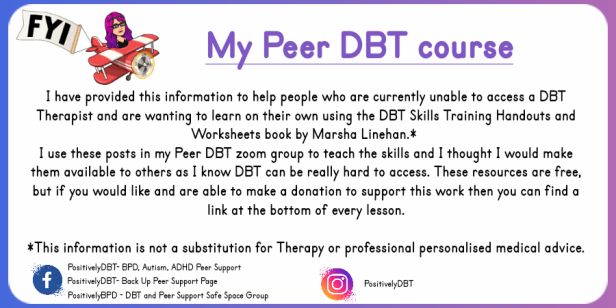
The handouts for this lesson are on pages 117- 119 (you will need page 119 for a part of this lesson)
Introduction to Interpersonal effectiveness
Interpersonal effectiveness skills are skills that can help you to get things that you need such as making requests, problem-solving and repairing relationships, as well as helping you to say no more effectively. These skills can also help you strengthen current relationships and end destructive ones.
How do you feel your interpersonal effectiveness skills are at the moment? Do you struggle to ask for things that you want? or to say no to something?
In this module we will be covering: clarifying priorities, objectives effectiveness – DEAR MAN, relationship effectiveness – GIVE, self-respect effectiveness – FAST and factors to consider.
Then we will move on to the second part; Building Relationships and ending destructive ones. This part contains; finding and getting people to like you, mindfulness of others, and ending destructive relationships.
The third part of this module is walking the middle path which includes; dialects, validation, recovering from invalidation and strategies for changing behaviour.
Goals
As with the start of every module, we will first take some time to think about what you want to get out of this part of DBT. The image below is based on the worksheet but the worksheet is on page 117.
Take a few minutes to look over the goals, ticking any of that you would like to work towards and also adding any specific goals you may have. There will be time to discuss as a group after. 🙂

Factors that can get in the way
There are things that can crop up and get in the way of us using interpersonal skills and we will discuss some of them now, as if we are able to identify them then we can then try and problem-solve to remove those barriers.
Note – It’s not always just one thing that gets in the way and could be a combination of things.

*Lack of skill – This one has come up in all of the skills where we have looked at what can get in the way. If we don’t know how to use the skills or don’t have the skills in the first place then how can we use them?
A lack of skill could be for many reasons, one reason could be that maybe the person was brought up where these sorts of skills weren’t demonstrated and so they didn’t learn them or even know they existed. This doesn’t mean that the person isn’t motivated to learn but that they simply don’t know how until they can learn it.
One of the most common things that I encounter when talking to people who are new to DBT, is their frustration at not being able to use the skills when they are in crisis or need them the most. I can empathise completely as I also felt this way at first until I realised that it would take a lot of time and practice until I really knew the skills well enough to use them effectively. It is frustrating but if you were learning a language, would you expect to be fluent within a few months? ( please choose a different metaphor if you’re awesome at languages lol.) So even once we know the skills by name, it can still take time until they become a skill we really know.
*Not having a clear goal or objective – If you don’t know what you want to get out of the situation, how can you manage it effectively?
Indecision may get in the way of us knowing what we want when there are lots of things to consider, this can cause confusion and extra layers of emotions making things more of a challenge. It’s possible there could also be indecision about how strongly you should ask for something or say no, as trying to work out how to balance our needs with the needs of others is not always easy. Having a clear goal or objective can give us a path to follow.
* Emotional Mind – If our emotions are in the driving seat or if they are really overwhelming then it could affect our ability to use skills as we are not factoring in logic and reason to the situation. We can act impulsively and forget about our goals.
*Prioritising short-term goals over long-term goals – Sometimes in the moment, we can forget about our long-term goals, not thinking about how our actions may affect them. Especially if the outcome we get instead, in the short term, is pleasant or ends the situation quickly, and sticking with the longer-term goal is harder.

*Other people or variables get in the way – Environmental factors such as other people may get in the way of using these skills as they may cause us to feel anxious or present us with problems to solve before we can ask for what we want or say no. Other people may create conflict when we try and stand up for ourselves or ask for what we want and all of this can affect our ability to use skills.
*Myths – Myths can also get in the way and be barriers to using skills as we have spoken about in previous lessons. Many of us have worries about how other people will view us or what we should be doing, sometimes these things can be based on myths and if that’s the case they could be barriers to using these skills to ask for what you want or to say no to something strongly.
Myths that can get in the way
Myths in particular can get in the way of using Interpersonal skills, the worksheet for this is on page 119, and gives a big list of myths with space to challenge them. By challenging myths we can start to break them down and when we break them down, we can get rid of them, and not be held back by them anymore.
Group exercise – I’ll give you some time now to look over the worksheet and I want you to check the myths that you believe are true and then start to challenge them. We will then go through some of your challenges as a group and then discuss any that you relate to but struggle to challenge.
Below are a few examples for those without the workbook.
Pros and Cons of using skills
If there is time in the lesson we will do a pros and cons of using these skills, together, if there isn’t time then please also do this as part of your homework this week.
If you are learning alone then this is an opportunity for you to practice your Pros and Cons skills and take some time to think about the Pros and Cons of using Interpersonal Skills ( hint* take a look at the goals for some pros)
If you need a refresher on the Pros and Cons skill, you can find it here – https://positivelybpd.wordpress.com/2022/12/12/74-positivelydbt-peer-dbt-2-distress-tolerance-pros-and-cons-and-tipp-skills/
Homework – The worksheets for this week’s homework are on pages 167 – 169

Pros and cons of using interpersonal effectiveness skills – this is a good one as not only does it give you an opportunity to practice pros and cons but also the pros can motivate you to practice and use these skills.
Challenging myths in the way of obtaining objectives worksheet – Go through the list and challenge as many myths as you can, we can go through any that you struggle with and discuss them as a group in the homework feedback time in the next group. (Those in the DBT group to finish any we haven’t covered in the lesson.)

If you are finding the content helpful then please do consider donating to support what I do. https://ko-fi.com/positivelydbt


